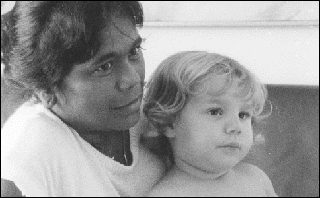|
|
|
監督・編集:ニリタ・ヴァチャニ
Director, Editing : Nilita Vachani |
デリー大学で英文学を学んだ後、ペンシルヴァニア大学アネンバーグ・コミュニケーション校でコミュニケーションを、アート・インスティテュート・オブ・シカゴで映画製作を学び、それぞれ修士号を取得。1985年から1987年までニューヨークでドキュメンタリー映画編集に従事。ミラ・ナイールの『サラーム・ボンベイ』の助監督を務める。これまでに自ら監督、製作、編集を行った『Eyes of Stone』(1990)、『Diamonds in a Vegetable Market』(1992)、『母がクリスマスに帰るとき…』(1995)は、3作とも国際的に高く評価されているドキュメンタリー作品である。現在は、ペンシルヴァニア大学でドキュメンタリー映画の製作を教えている。 Studied English literature at Delhi University and then took a Master's in Communications from the Annenberg School of Communications, University of Pennsylvania and a Master of Fine Arts in Filmmaking from the Art Institute of Chicago. From 1985 to 1987 she worked in New York as a documentary film editor. She was assistant director to Mira Nair on Salaam Bombay., and has directed, produced and edited three international award winning documentaries, Eyes of Stone (1990), Diamonds in a Vegetable Market (1992) and When Mother Comes Home for Christmas... (1995). She is now teaching a documentary film workshop at the University of Pennsylvania. |
 |
|
|
ある年のクリスマス、ギリシャで働いているスリランカ女性ジョセフィーヌは、8年ぶりで里帰りをする。彼女を待っているのは3人の子供たちだ。 彼女の送金によってバスを手に入れた長男は、まずまずの生活を築いているが、長女は満たされない境遇から逃れるように結婚を急いでいる。そして、寄宿学校(兼孤児院)に預けられている末の男の子には、あきらかに問題がありそうだ。映画は、一人の女性の日常の仕事を、細部まで丁寧に追っていく。ちょっとした仕草や表情を捉えて家族との関わりを描き、それらを緻密に積みあげていって簡潔な物語を作りあげている。 しかし、そこには働く女性と母を必要とする子供たち、という古典的な問題から、女性の社会進出を支えるのが他の女性の犠牲を伴った労働である、というような今日的な問題に到るまで、様々な問題が含まれている。 私たちはそのなかに身近な問題を見いだし、ジョセフィーヌという遠い異国の女性、一見私たちとはまったく違った境遇の女性に、より親近感を抱くことになるだろう。 |
After eight years of absence, a Sri Lankan woman working in Greece returns home for Christmas. Her three children await her. Her eldest son has made a rather comfortable life for himself with a bus acquired by means of money she sent home, but her eldest daughter marries in haste to escape her unpleasant life. The youngest boy, whose care is entrusted to a boarding school (also an orphanage), is clearly going through some problems. This film thoughtfully tries to capture the details of one woman's daily chores. Seizing on insignificant gestures and expressions, it depicts her family and its relations; each detail laid finely upon the next to create a simple but concise story. Within this narrative, the film deals with both the classic problem of working women coping with children demanding their care, and also the contemporary problem that what supports one woman's social advancement involves the sacrifice of another woman's labor. A whole range of other related problems are also addressed. As the film progresses we come to detect a familiar problem and
begin to feel an intimacy with Josephine, this woman from a distant
and foreign country whose circumstances at first glance are so
different from our own. |
|
|
|
|
監督のことば 経済活動のグローバル化が進む現代において、需要と供給の法則が最も痛烈に感じられるのは商品が人間である場合です。 近年、フィリピン、スリランカ、エチオピア、メキシコなどの貧しい国から海外へ出て家政婦や乳母として働き、自国の貧困状況から逃れる女性達が圧倒的な人数にのぼっています。 その結果、複雑な皮肉に満ちた状況がうまれています。女性解放運動のおかげで、女性は家から出て職業につくようになりました。なかでもより恵まれた女性たちは、家庭の空白を埋めるために“第三世界”の女性を雇い、子供の世話や家事のきりもりをさせることができます。では、雇われた女性の子供の世話は誰がするのでしょう?そして、大群をなして他国の家庭にジェンダー役割を売りに出かけている女性たちの自国には、どんな影響を与えるのでしょうか? 私の映画はひとりの移住労働者の物語を通してこの逆説を探ります。ジョセフィン・ペレラは3人の子供の母、子供たちをスリランカに残して豊かな生活のためにギリシャのアテネに渡りました。彼女は裕福な郊外の家庭を完璧にきりもりし、母親が仕事のためにパリに住んでいる2才のイサドラを愛情をこめて世話しています。 ジョセフィンは自分の子供には8年間会っていませんが、懸命に働き、子供と自分の将来のためにこつこつとお金を貯めています。ジョセフィンは今年、故郷の子供達のもとへ1ケ月間戻ります。子供達は、このほとんど知らない女性に母親を見出すのでしょうか?1ケ月の持ち時間の間に、ジョセフィンは子供達のために家庭を築くのでしょうか?この映画を製作する過程で、私はジョセフィンが過去何年間ものあいだ辿ってきた旅に相当する旅に出ました。入り組んだ現実と切り結んでいるがために、答を与えるよりも多くの疑問を投げかける旅に。 |
Director's Statement On the stage of global economies, at no time are the effects of
the laws of supply and demand more keenly felt as when the commodity
is the human being. This has created a situation rife with a complex irony. Women's liberation has taken the woman out of the house into the professional sphere. The more privileged amongst us can afford to hire a ' third world ' woman to fill the lacuna at home: to care for the children and run the house. But who is there to take care of this woman's children? And what is the likely impact on a nation whose women migrate in droves selling their gender functions to the domestic spheres of others? My film explores this paradox through the story of a single migrant worker. Josephine Perera, mother of three, has left her children behind in Sri Lanka to earn her living in Athens, Greece. She runs a rich, suburban household to perfection, taking tender care of two-year-old Isadora, whose mother lives and works in Paris. Josephine has not seen her children in eight years, but she works hard, carefully saving the dollars that will guarantee their future and her own. This year Josephine will go home for one month to visit her children. Will they find their mother in this woman whom they scarcely know? Will Josephine make a home for them in the single month she has? In the process of making this film, I embarked on a journey parallel to the one that Josephine herself has been on for the last many years. A journey which because of the complex reality it engages raises more questions than it can answer. |
